中國民族音樂資料館 Chinese Music Archive
人物篇 - The Artists
LIU Tian-hua – Master of Ethnic Music
HUA Yan-jun (A Bing) - Folk Musician
LU Wen-cheng - Master of Cantonese Music
GUAN Ping-hu - Qin Music Discovery and Arrangement Expert, Performer
WU Jing-lue - Qin Music Education and Research Expert, Performer
WEI Chung-loh - An all-rounder of Chinese musical instruments
LIU Ming-yuan - The Master of Chinese Bow and String Music
PENG Xiu-wen - Pioneer of Chinese National Orchestra
Coming Soon - Artists Albums
LIU Tian-hua
HUA Yan-jun
SUN Wen-ming
ZHA Fu-xi
GUAN Ping-hu
ZHANG Zi-qian
LIU Shao-chun
WU Jing-lue
YAO Bing-yan
ZHAO Song-ting
LU Chun-ling
LIU Ming-yuan
TANG Liang-de
LIU De-hai
WANG Fan-di
AN Zhi-shun
[一] Introduction to Folk Music Masters (一)
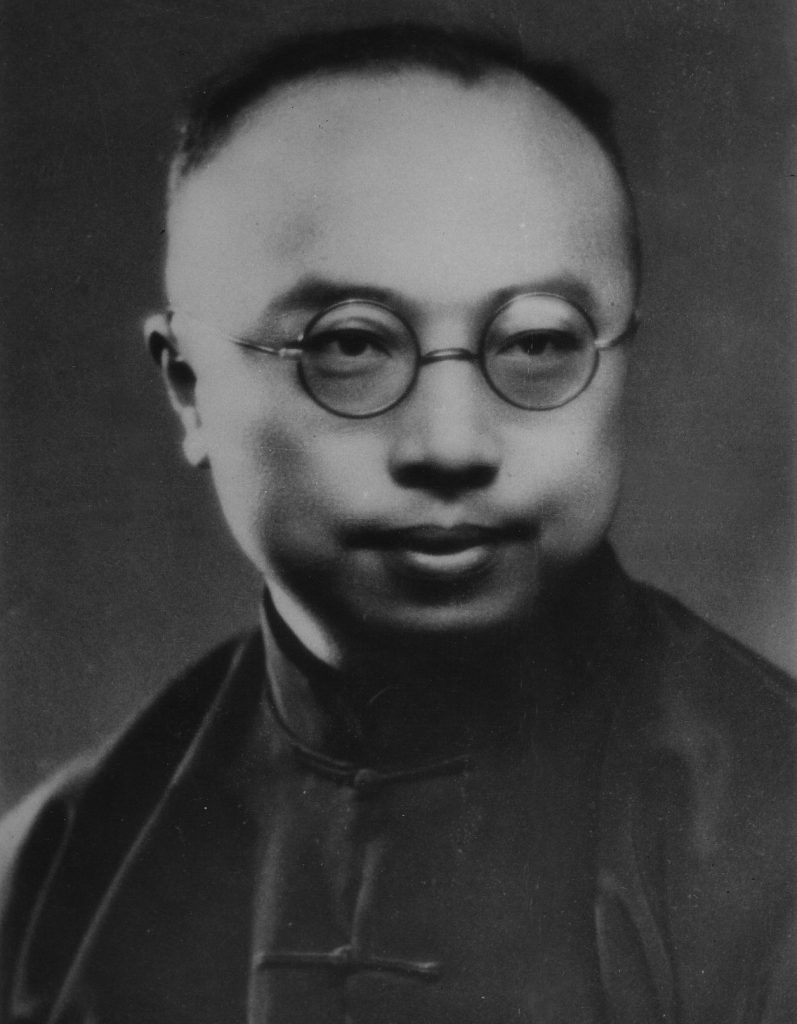
劉天華 - 民族音樂家
劉天華, 一八九五年二月四日生於江蘇省江陰縣城內西橫街四十九號, 一九三二年六月八日晨五時二十分因患猩紅熱,病逝幹北京, 享年三十七歲。劉先生是五四時代中國最優秀的器樂作曲家, 同時也是卓越的二胡、琵琶演奏家和音樂教師。一九一一年, 辛亥革命爆發, 離開常州中學, 由於家境貧寒, 未再升學, 返裏後, 開始音樂工作, 期間除了深造原所習之軍樂樂器外, 又從周少梅學習琵琶及二胡, 從沈肇洲學習琵琶, 並到河南尋師學習古琴, 於此十年間寫成了二胡獨奏曲《病中吟》、《月夜》、《空山鳥語》的初稿。一九二二年, 赴北京, 在北京大學音樂傳習所、北平女子高等師範學校音樂系、北平藝專音樂系授課, 又從托諾夫學習小提琴, 從歐羅伯學習理論作曲, 並同時涉獵三弦拉戲。一九ニ七年, 與友創辦「國樂改進社」, 編刊了《音樂雜誌》, 在北京期間, 除了編寫二胡和琵琶教材外, 還創作了二胡獨奏曲《苦悶之驅》、《光明行》、《良宵》、《閑居吟》、《悲歌》、《獨弦操》、《燭影搖紅》, 及琵琶獨奏曲《歌舞引》、《改進操》、《虛籟》, 和一首絲竹樂合奏曲《變體新水令》, 劉先生又為梅蘭芳出訪美國, 聽寫了梅氏演唱的京劇及昆曲唱腔, 編印成《梅蘭芳歌曲譜》一巨冊。劉先生以畢生的精力從事中國音樂的收集、研究、創作和教學, 通過實踐, 立誌改進和發展民族音樂, 以獨到的見解, 反對全盤西化論, 亦反對排斥西方文化的國粹主義, 主張曲譜維新, 改進國樂使與世界音樂「並駕齊驅」, 被譽為中國用近代記譜方法搜集整理民間音樂最早的一個人, 其學生曹安和、吳伯超、蕭伯青、韓權華、王君僅、陳振鐸、蔣風之………等對近代中國音樂的發展均曾起到了積極的推動作用。他還搜集整理了《安次縣吵子會樂譜》、《佛曲譜》等, 不過有些原始材料已經散失, 沒有留傳下來。可惜天嫉英才, 他在一九三二年六月一日赴北京天橋收集鑼鼓譜時染上猩紅熱, 罹病僅一星期而謝世。今天我們只能從他的四首遺音中去揣摩了解他的音樂真諦。
LIU Tian-hua
LIU Tian-hua was born on February 4, 1895 in Jiangyin, Jiansu province and passed way of scarlet fever in Beijing on June 8, 1932. He was the great master of Chinese national music, both in composition and performance. In 1911, he returned from his school in Changzhou to Jiangyin and started his music career. He Learned the pipa and erhu from ZHOU Shao-mei and further studied the pipa from SHEN Shao-zhou. He even spent his summer holidays in Henan for studying of guqin there. In ten years’ time, he made drafts of the erhu works of Sigh of Ailment, Moonlit Night and Bird-call in the Mountain. In 1922, he came to Beijing and was successively appointed to the high-level educational units as music teacher. He started to learn the violin from Russian Professor Tonov and music theory from Professor Albert. In 1927, he founded the Association for the Advancement of Chinese Music in Beijing and published the Music Magazine. During his time in Beijing, he wrote many erhu and pipa training materials. Besides, he also composed erhu pieces Song in Desolation, March towards Brightness, New Year’s Eve, Leisure, Song of Melancholy, Monologue on a Single String, Candle Shadows Flickering Red and pipa pieces From the Opera, March for Betterment, Sound of Silence, together with an ensemble work Variations on a Traditional Tune. In 1929, he recorded MEI Lan-fang’s songs in both Chinese and European notation in the book Selections from the Reperoire of Operatic Songs and Terpsichorean Melodies of MEI Lan-fang for Mei’ s performance trip to United States. LIU Tian-hua’s hard working on Chinese music collection, researching, composing and teaching let him successfully to achieve his goal of advancement of Chinese music. Under his training, his fellow students CAO An-he, WU Bo-zhao, XIAO Bo-qing, HAN Quan-hua, WANG Jun-jin, CHEN Zhen-duo, JIANG Feng-zhi, etc. had taken important part in the development of Chinese music.
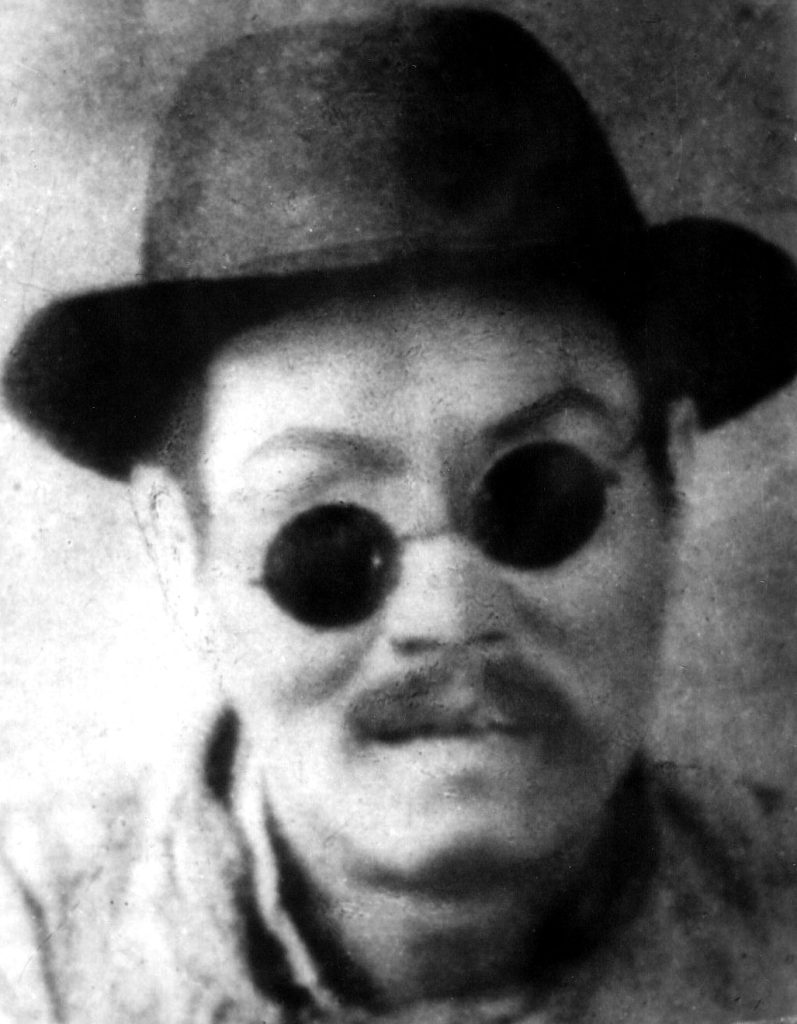
華彥鈞(阿炳) - 民間音樂家
華彥鈞, 一八九三年八月(癸已年七月初九日)生於江蘇無錫東亭鄉, 一九五○年十二月四日(庚寅年十月二十五日)與世長辭, 享年五十八歲。華度彥鈞別名阿炳, 是無錫雷尊殿當家道士華清和的獨生子, 華清和號雪梅, 擅長演奏多種民族樂器, 尤以琵琶為精, 阿炳自幼從父學習多種樂器, 並很快地掌握了這些樂器的性能。他四歲喪母, 二十一歲患眼疾, 逐漸惡化, 二十六、七歲時瞎了一只眼晴, 因此得不到齋主們的歡迎。三十歲離開道門, 以賣唱和演奏樂器為生。三十五歲時雙目失明, 從此流浪街頭, 被稱為「瞎子阿炳」。一生遭遇坎坷, 但他愛僧分明, 用自己的歌喉和手中的樂器, 對社會上的邪惡勢力、卑劣行為進行暴露和押擊。報上的新聞他唱, 聽來的新聞他也敢唱。一九二七年四月十二日, 當權派殺害了進步人士秦啟, 阿炳編唱了《秦啟血濺大雄寶殿》; 一九三二年, 十九路軍在上海孤軍抗戰, 他編唱了「十九路軍大刀隊殺東洋鬼子像切西瓜」;一九三八年, 作惡多端的縣長楊高伯被遊擊隊擊斃, 他編唱了《槍斃楊高伯》。 抗戰期間他還編寫過《漢奸的下場》等歌詞, 抗戰勝利之後, 他對國民政府的統治極為不滿, 唱出了「前走狼, 後走虎, 世上貓子吃老鼠」和「金元券滿天飛」的歌詞, 對時政進行了無情的揭露。阿炳的器樂演奏深為當地群眾喜愛, 這和他廣泛學習分不開。幾十年來, 他聽見自己喜愛的音樂就學, 超脫了狹窄的師承保守觀點, 毫不拘泥地以眾人為師, 自己有所創造, 創作了一批樂曲。一九五0, 年楊蔭瀏先生對他進行采訪時, 錄下了他創作和傳譜的二胡曲《二泉映月》、《聽松》、《寒春風曲》及琵琶曲《大浪淘沙》、《昭君出塞》、《龍船》六首樂曲, 阿炳演奏的這些曲調來源, 通常都是一個啞謎, 無法印證出處, 都曾被假借自「梵音」, 但到目前為止也沒有任何考證是與道家音樂有關, 因此, 就極可能是阿炳自己的作品。可惜正當他苦盡甜來的時候, 他所會的幾百首樂曲還沒有來得及錄音, 便與世長辭了, 但是, 他的音樂傳到了全世界, 感動了無數的聽眾。
HUA Yan-jun
HUA Yan-jun was born in August 1893 in Dongting, Wuxi, Jiangsu province and assed away on December 4, 1950. He was a renowned folk musician also alias Ah Bing. He was the only son of the Taoist priest HUA Qing-he alias Xue-mei, who was in charge of the Leizun Temple in Wuxi. Since his childhood, Ah Bing had been learning many instruments from his father. When Ah Bing was four years old, his mother died. When he was about twenty six or twenty seven, one of his eyes became blind, and at the age of thirty, he left the Taoist world and began to earn his living by singing and playing instruments. At the age of thirty five, he became totally blind, and people started to call him “Ah Bing the Blind”. His life was miserable, but he kept a firm moral stance. He sang the news from the press and also news that he heard from other people. After the victory of the War against Invasion, he was very disappointed by the rule of the Government, and he sang songs criticizing openly the exploitation of the people by the government and the serious problem of inflation. The instrumental performance of Ah Bing was deeply loved by the local audience. He was not restricted by the conservative attitude of following only one master. He considered many as his teachers while going on with his own composition, resulting in his many works. In 1950, when YANG Yin-liu visited him, he made recordings of six pieces of music that he composed or passed down. When people began to recognize his artistic achievements, before recording down the hundreds of works in his repertoire, he passed away unfortunately at the age of fifty eight. However, his music travels around the world and has touch the hearts of an untold number of people.
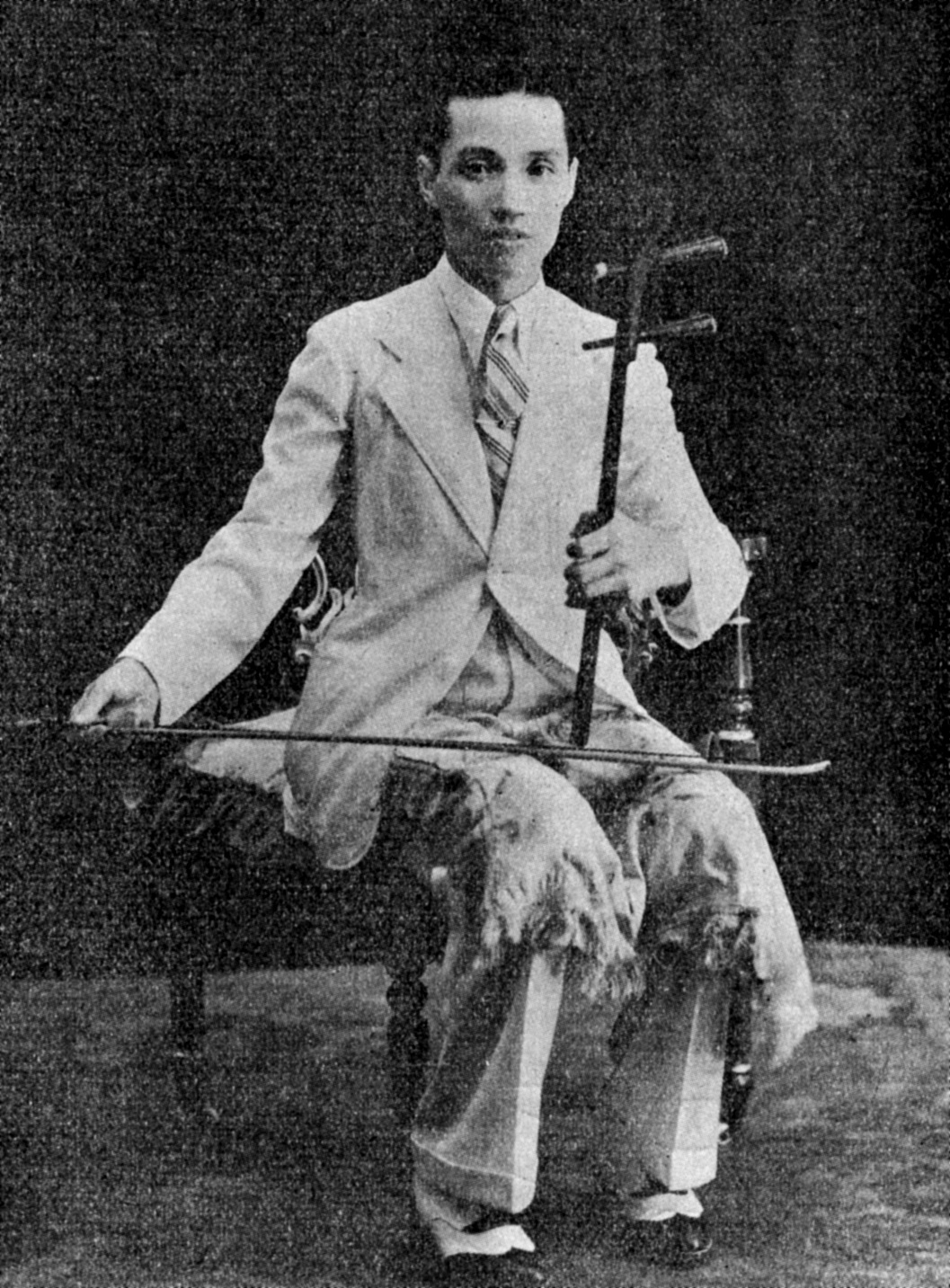
呂文成 - 粵樂宗師
呂文成, 一八九八年三月十二日出生於廣東中山縣石岐鎮南門一清貧農家, 一九八一年八月二十二日病逝於香港。一九O一年, 隨父遷居上海的粵籍移民所聚居之虹口區, 一九O八年, 免費入讀廣肇義學, 一九一三年, 畢業後當銀匠徒工, 因性好音樂, 更嗜好胡琴與揚琴演奏, 不時得到俱樂部樂隊的音樂家指導, 又與任悔初、黃詠臺等絲竹及粵樂名家往還, 技藝大進, 同時, 參加上海中華音樂會及精武體育會粵樂組的各種活動, 並成為音樂導師, 聲名漸著, 至二十歲時, 已有「二胡博士」之雅號。一九二六年, 得司徒夢巖啟發, 將「江南二胡」創改為「粵樂二胡」;又將「七音洋琴」改製為「八音洋琴」, 其高音聲部的原有銅線, 同時亦被創先以鋼絲弦替代使用;其亦長於演唱粵曲「旦喉」, 自打揚琴自唱之《燕子樓》、《瀟湘琴怨》及頌揚革命家秋瑾女士的《秋魂夜怨》等唱腔, 流芳於世, 經久不衰。一九二四年, 與司徒夢巖合作為「上海大中華留聲機器公司」灌錄了首張粵調合奏唱片《到春雷》及粵曲唱片《燕子樓》、《蒲湘琴怨》等, 蜚聲海內外, 此後, 開展了粵樂的「新樂階段」, 以改良的軟弦、軟弓樂器奏和小曲「聯發體」的「平腔」演唱, 並漸漸地取代了原有的硬弦、硬弓樂器拍和「板腔體」的「假腔」演唱之「古樂階段」。一九三二年「一.二八」戰役後, 呂文成離開上海到香港, 繼續為「新月唱片公司」從事粵樂演奏及灌錄唱片之工作, 又參與香港鐘聲慈善社等粵樂組織之活動, 其後, 在「和聲唱片公司」組織「歌聲音樂團」, 以「歌林唱片」為牌號, 出版了大量的粵樂及粵曲唱片, 亦時有參與其它唱片公司之製作, 在大半個世紀的藝術生涯中, 呂氏錄製的粵樂及粵曲唱片達數百張, 其創作之粵樂、粵曲等亦達百數以上。二戰開始時, 香港即淪陷, 呂文成轉往廣州謀生, 與友組織樂隊, 在廣東一帶之城鎮巡回演奏, 二戰結東後, 重返香港, 開始提倡粵語演唱流行小調, 創作大量新腔, 被譽為「粵語流行曲」之父。其一生所創作改編的粵樂作品包括《蕉石鳴琴》、《燭影搖紅》、《平湖秋月》、《醒獅》、《下山虎》、《步步高》等等家喻戶曉名曲百余首。
LU Wen-cheng
LU Wen-cheng was bron on March 12, 1898 in Zhongshan, Guangdong province and passed away of illness on August 22, 1981 in Hong Kong. In 1901, he moved to Shanghai with his father. In 1913, he graduated from school and started to learn music from the members of the ensemble of his working area. He then made friends and further studied with REN Hui-chu and HUANG Yong-tai in the yangqin performance. At that time, he studied hard with diligence him a fame of “Master of Erhu”. He joined the activities of the Guangdong Societies and got in Shanghai. Over there, he made friends with most of the Guangdong musicians. 1924, he and SITU Meng-yan was invited by the Shanghai Great China Record Company to record down three sets of Guangdong music and songs. In 1926, he was guided by the violinist SITU Meng-yan to transform the Jiangnan erhu into a new format which let him to invent the Guangdong erhu. Later, he continued his reformation of musical instruments on the yangqin. In 1932, he left Shanghai and moved to Hong Kong, working in the New Moon Record Company, many new pieces of Guangdong music played by him with his new invented instrument were widely spread. Around 1937, he joined the Wo Sing Record Company to continue his recording live to produce the “Columbia” label with Guangdong music records. During World War II, he moved to Guangzhou and formed an ensemble there. After the war, he came back to Hong Kong and started to compose of songs of Guangdong language which led a new stage and gain him a fame of “Father of Guangdong Songs”. Among his hundred of compositions, of songs there are some famous ones Playing the Lute by the Plantain and the Rockery, Candle Shadows Flickering Red, Autumn Moon Upon Placid Lake, Awakes Lion, Stepping High, etc.
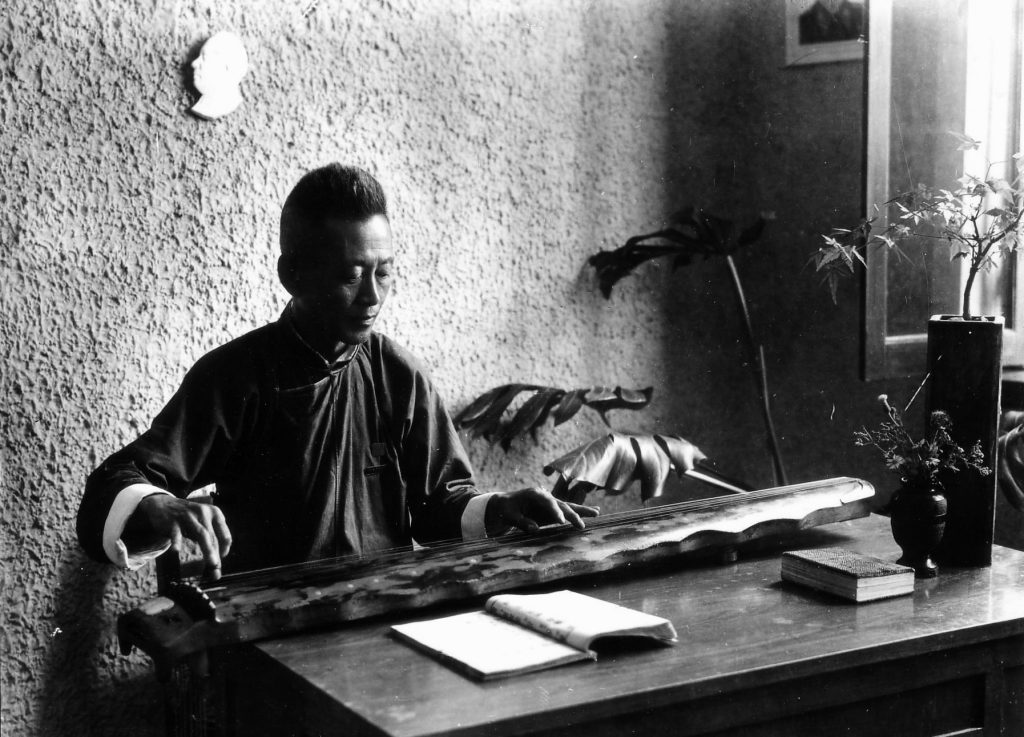
管平湖 - 琴樂發掘及整理專家、演奏家
管平湖, 一八九七年二月二日出生, 一九六七年三月二十八日卒於北京, 祖籍江蘇蘇州。管先生名平, 字吉庵、仲康, 號平湖, 自稱門外漢, 是清代官庭如意館畫院院長及北京著名琴家俞香南學生的名畫家管念慈之次子。管平湖自幼酷愛藝術, 彈琴作畫皆得家傳, 又從師名畫家金紹城, 學花卉、人物之工筆筆法, 成為「湖社」畫會之主要成員之一, 並任教於北平京華美術專科學校。其古琴藝術深得九疑派楊宗稷、武夷派悟澄老人及川派秦鶴鳴等名琴家之真傳, 除博取三派之長, 又從民間音樂中汲取營養, 融會貫通, 自成一家, 達到近代中國琴壇「管派」的地位。演奏風格以樸素豪放而雄健瀟灑, 含蓄蘊藉而情趣深遠見稱。其演奏《流水》一曲, 尤特著名, 獲「管流水」之美譽, 一九七七年八月二十日, 美國發射的「航行者」號衛星, 將管氏此曲錄入噴金的世界名曲唱片中, 使中國的古琴樂音首次響徹太空至今。在一九一一年, 他便參加了楊宗稷在北京創辦的「九疑琴社」, 到了一九三八年, 他又與北京的琴家們組織「風聲琴社」, 並經常在他家中, 一起作畫、吟詩、彈琴交流技藝。一九四七年, 他與張伯駒、溥雪齋、王世裏、楊葆元、鄭瑉中等人發起組織了「北平琴學社」, 至一九五四年, 改名「北京古琴研究會」。他曾先後在北京漢學專修館、國樂傳習所、北平國立藝術專科學校任教, 一九五二年, 應聘到中央音樂學院民族音樂研究所, 任副研究員, 從事古琴音樂教學和發掘打譜研究工作。管先生畢生精力傾註在琴樂打譜方面, 經他率先發掘整理的古譜有《廣陵散》、《碣石調, 幽蘭》、《離騷》、《大胡笳》、《胡第十八拍》、《秋鴻》、《欸乃》等許多著名大曲, 使這些絕響已久的古琴音樂得以重新恢復了藝術生命, 他對此項起潛振絕的雄偉工作, 做出了極為巨大的貢獻, 同時, 在發掘這些古譜所遇到的指法問題, 他又作出了精心的研究, 並提出自己的真知灼見, 著成了《古指法考》一書傳世, 使後學者在繼承琴曲的發掘打譜上, 更能藉此獲益為用。
GUAN Ping-hu
GUAN Ping-hu was born in Suzhou, Jiangsu Province. His first name was Ping, alias Ji-an, Zhong-kang and Ping-hu. However, he called himself the layman. He was born on February 2, 1897 and passed away on March 28,1967 in Beijing. He was the son of GUAN Nian-ci, a famous painter in the Qing Dynasty. Influenced by the family, he started to learn music since his childhood. He studied in depth the performing art of qin and was influenced significantly by YANG Zong-ji of the Jiu Yi School, Master Wucheng of the Wu Yi School and QIN He-ming of the Szechuan School. However, he combined the features of different schools and adopted the styles of folk music to create his own qin school of Guan. The style of the Guan school is plain and unconstrained, modest and profound. He got his fame in playing Flowing Water and this qin piece played by him was collected into the Gold CD which was brought to the universe by the U.S. spaceship Voyager launched on August 22, 1977. The charm of Chinese qin was displayed in the universe for the first time. In the early years of the Republic of China, he joined the Jiu Yi Qin Society founded by YANG Zong-ji in Beijing. In 1938, he organized with other Beijing qin artists a qin society – The Sound of Wind. His easy-going and generous character won him a lot of friends. His home became a centre for Beijing qin artists to paint and play qin and exchange experience. In 1947, together with five other artists, he founded Qin Society of Beijing. The name was changed to the Beijing Qin Research Association in 1954. He once taught in the Beijing Chinese Research School, Chinese Music School and Beijing National Arts School. In 1952, he was appointed to teach qin and transcribe ancient scores in the Traditional Music Research Institute of Central Conservatory. He spent his whole life in the playing art and the transcription work of qin. His contribution in transcription of ancient score is so great that many ancient pieces were brought to life again through his hard work. His book Study of Ancient Fingering Techniques presents his unique understanding in that field.
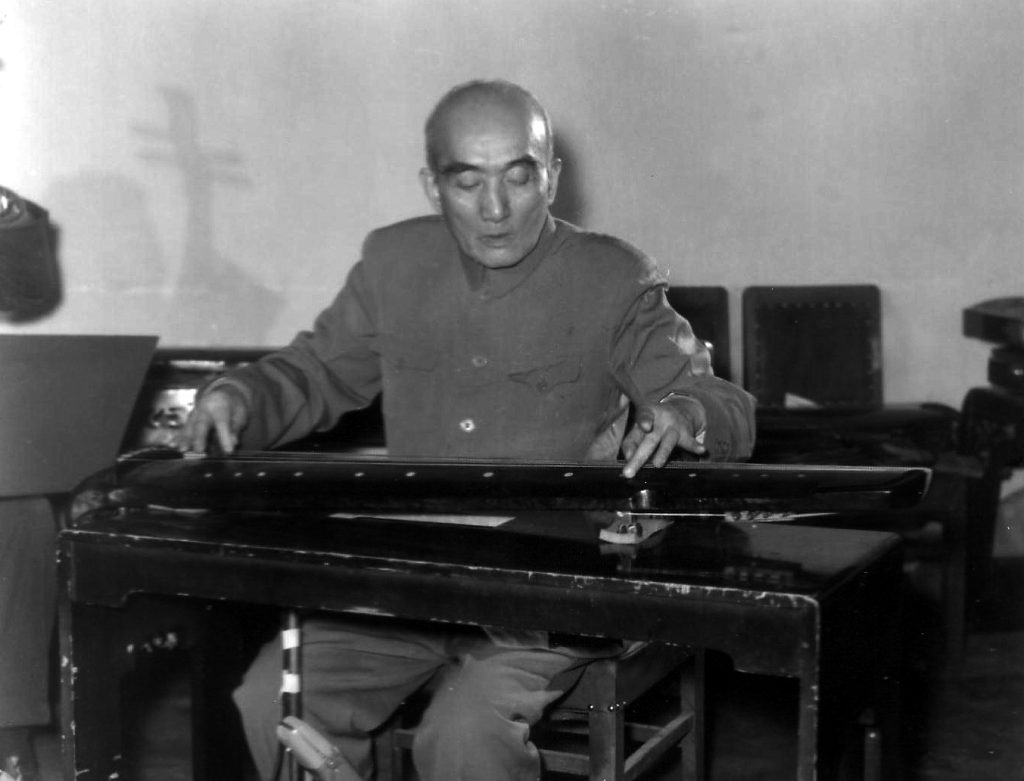
吳景略 - 琴樂教育及研究專家、演奏家
吳景略, 一九O七年二月五日生於常熟西塘, 一九八七年八月十六日病逝於北京, 祖籍江蘇省常熟西塘。吳先生名韜, 別號緩更, 少時從學民族樂器於趙劍侯、周少梅、吳夢非等;一九二七年, 從天津琴家王端樸習琴, 勤奮上進, 四方求教, 博采眾家之長, 自成一體, 並於一九三六年四月, 經琴家李明德介紹, 參加在蘇州創立的「今虞琴社」, 一九三九年及一九五六年, 兩度被選任司社之職, 主持「今虞琴社」社務, 又曾以「簫聲琴韻室」之名, 在上海、常熟兩地教授古琴, 先後招收了翁瘦蒼、沈心工、呂振原等五十余名學生。在此期間, 據《五知齋琴譜》、《神奇秘譜》、《松弦館琴譜》、《風宣玄品》等十余種明清古譜, 發掘整理了近四十首古代琴曲, 並創作了《勝利操》, 移植改編了《新疆好》等歌曲。自三十年代以來, 在各種音樂會上經常表演古琴獨奏, 並為電臺、研究單位和教學單位錄製了大量的音像資料。一九五三年, 被聘為中央音樂學院民族音樂研究所通訊研究員, 一九五六年秋, 任中央音樂學院民樂系彈撥教研室主任, 專門從事古琴教學和研究工作, 為新中國培養了不少古琴演奏和研究人才。吳景略潛心琴藝, 在古琴流派中獨樹一幟, 被稱為「虞山吳派」, 其演奏以氣韻見長, 兼有北之雄奇、豪宕與宏廓, 又有南之清洞、柔婉和流麗, 落指成珍, 揮掌可範, 精熱神妙, 燁爍古今。其演奏的《瀟湘水雲》、《普庵咒》、《漁樵問答》、《梧葉舞秋風》、《憶故人》、《陽春》、《胡茄十八拍》、《秋塞吟》、《墨子悲絲》 等早已錄成唱片, 畫聲海內外。吳景略又對鑒琴、修琴有很豐富的經驗, 並致力於古琴的改革, 一九五八年, 經反復試驗, 設計, 製成改革古琴, 是在不改變古琴原有的音色, 保持傳統演奏方法和盡量保留原來的民族形式的前提下, 而取得了音量擴大、消除滑指噪音等較理想的效果。一九七O年, 更成功地研製出鋼絲尼龍琴弦, 成為古琴發展歷程上的新裏程。在文字著作上有《七弦琴教材》、《虞山琴話》 《古琴改良》等琴學論著, 吳景略尤擅演奏《漁樵問答》, 更為琴壇稱道, 並獲「吳漁樵」的雅號。
WU Jing-lue
WU Jing-lue was bron on February 5, 1907 in Changshou county, Jiangsu province and passed away of illness on August 16, 1987 in Beijing. His first name was Tao and other name was Man-sou. He learned traditional instruments from ZHAO Jian-hou, ZHOU Shao-mei and WU Meng-fei. In 1927, he started to learn the qin from the Tianjin qin player WANG Duan-pu. Since then he had learned from many sources and developed his own style. In April 1936, he joined the Jinyu Qin Musicians Association founded in Suzhou. From 1939 to 1956, he was appointed as Chairman, running the association in Shanghai. In autumn 1956, he was appointed as Professor of the Central Conservatory, thus focusing his strength in the teaching and researching of the art of qin. He was experienced in assessing and repairing the qin instruments. He was enthusiastic in reforming the qin. After repeated experiments, the reformed qin was designed, which inherited the timber, performing techniques and outlook of the original qin while achieving larger volume and lower noise. In 1970’s, together with the instrument factory he successfully introduced the steel-nylon string which won the appreciation of most qin players, setting up a milestone in the development history of the qin. He wote articles and publications on the qin including Teaching Text Book of Qin, Qin Arts of Yu Shan and Reformation on Guqin, etc. His performing of a Dialogue between a Fisherman and a Woodcutter won him a fame of “WU Yuqiao”.
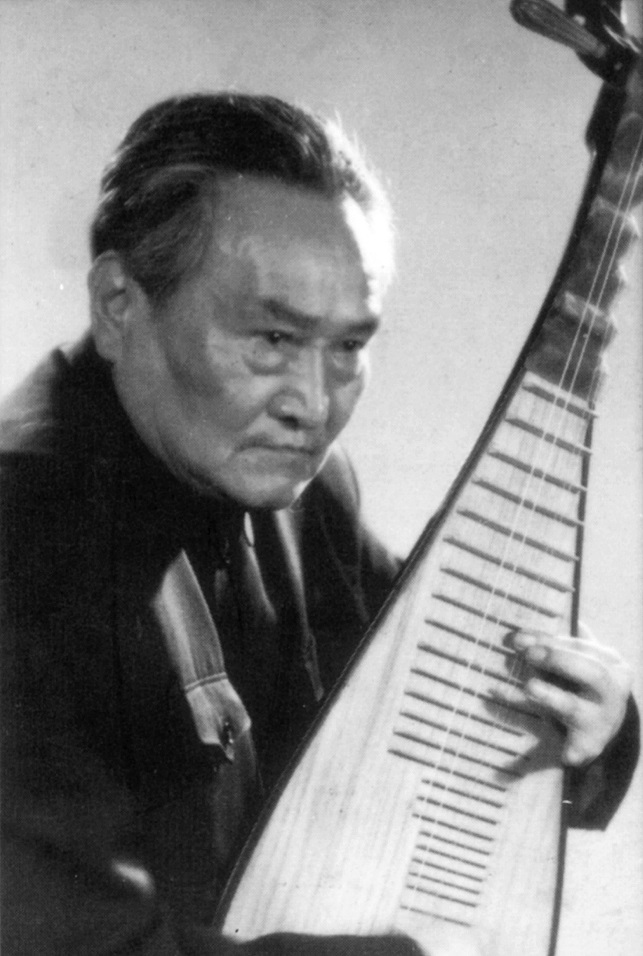
衛仲樂 - 民族樂器演奏的多面手
衛仲樂, 一九○九年三月十二日生於上海的一個碼頭工人家裏, 一九九七年四月七日逝世於上海的病榻中, 祖籍江蘇無錫。衛先生本姓殷, 過繼衛姓後更名衛秉濤、衛崇福, 其後鄭。文又替他改名衛伸樂。一九二六年, 因家貧得鄭。文免收會費, 招為「大同樂會」會員, 並拜在鄭覲文、汪昱庭、柳完章等人門下, 學習古琴、琵琶、小提琴等, 又從其他樂家學習簫、笛、二胡等民族樂器, 由於興趣、天賦及刻苦, 加上良師的指導, 成為首屈一指的學員。一九二八年, 在上海大光明電影院落成慶典中演奏《十面埋伏》一曲, 技驚四座, 後又在「世界社」舉辦了第一次別開生面的多種民族樂器獨奏音樂會, 揭開了中國現代音樂史上民樂獨奏音樂會的第一頁。一九三四年, 參加百代公司的國樂隊, 結識了聶耳, 並錄製了琵琶曲《塞上曲》及古琴曲《陽關三疊》等, 聶耳亦特為之報題。其後, 由於鄭覲文的辭世, 衛仲樂便於一九三五年接替了「大同樂會」樂務主任之職, 並應俄國作曲家阿隆, 阿南夏洛穆夫所指揮, 由辛格獨奏的阿氏以中國音樂素材創作的鋼琴協奏曲第二樂章, 組成民樂隊作協奏, 成為中國歷史上第一次用民族樂隊為鋼琴協奏。一九三六年, 阿隆特為衛仲樂創作了《楊貴妃之死》二胡套曲在蘭心戲院公演, 由衛件樂二胡獨奏, 工部局交響樂隊伴奏。一九三七年, 衛伸樂常在南京中央廣播電臺、上海廣播電臺、美國新聞處電臺、英國民主電臺、法國電臺和蘇聯呼聲電臺任音樂演奏員, 經常介紹劉天華的二胡曲和琵琶曲。一九三八年隨中國文化劇團赴美國演出, 頗獲盛譽, 又於一九三九年結東訪美前應當地的唱片公司邀請, 錄製了數張唱片。一九四一年創辦中國管弦樂隊及伸樂音樂館, 並在滬江、交通、同濟和上海美術專科學校等大專院校教授國樂。新中國成立後隨「中國文化代表團」出訪印度、緬甸、印度尼西亞等國;除任教於上海音樂學院外, 還受托籌建該院民樂系, 初任副主任, 一九五八年升為系主任, 一九八五年改任名譽系主任。他畢生致力音樂教育事業, 學生桃李滿天下。
WEI Chung-loh
WEI Chung-loh is a contemporary instrumentalist of Chinese music. He was born in Shanghai on March 23, 1908 and passed away of illness on April 7, 1997 in Shanghai. His ancestral home was in Wuxi, Jiangsu province. His last name originally named YIN and the first names were Bing-tao and Chong-fu. ZHENG Jin-wen gave him the name of WEI Chung-loh. In 1928, he joined the influential “Ta Tung National Music Research Institute”. There he learned many instruments including qin, pipa, erhu, jinghu, sanxian, xiao, bamboo flute and violin from ZHENG Jin-wen, WANG Yu-ting, LIU Yao-zhang and other famous players. His musicianship became so mature that he was appointed the Associate Music Director of the institute. In 1938, he was involved in many charity concerts in Hong Kong and in United States to raise money for Chinese refugees. The American critics called him “Kreisler on the pipa”. He also became “The first Chinese person to appear on American TV”. In 1939, he made 4 records before he left the States. In 1941, the member of “Ta Tung” became scattered, but this did not stop him from forming music societies and ensembles and teaching students. In 1949, the People’s Republic of China was established. Shanghai Conservatory employed him to teach Chinese music. In 1956, he became Associate Department Head of the Chinese Music Depart of Shanghai Conservatory. He became Department Head in 1958, and in 1985 he became Honorary Department Head.
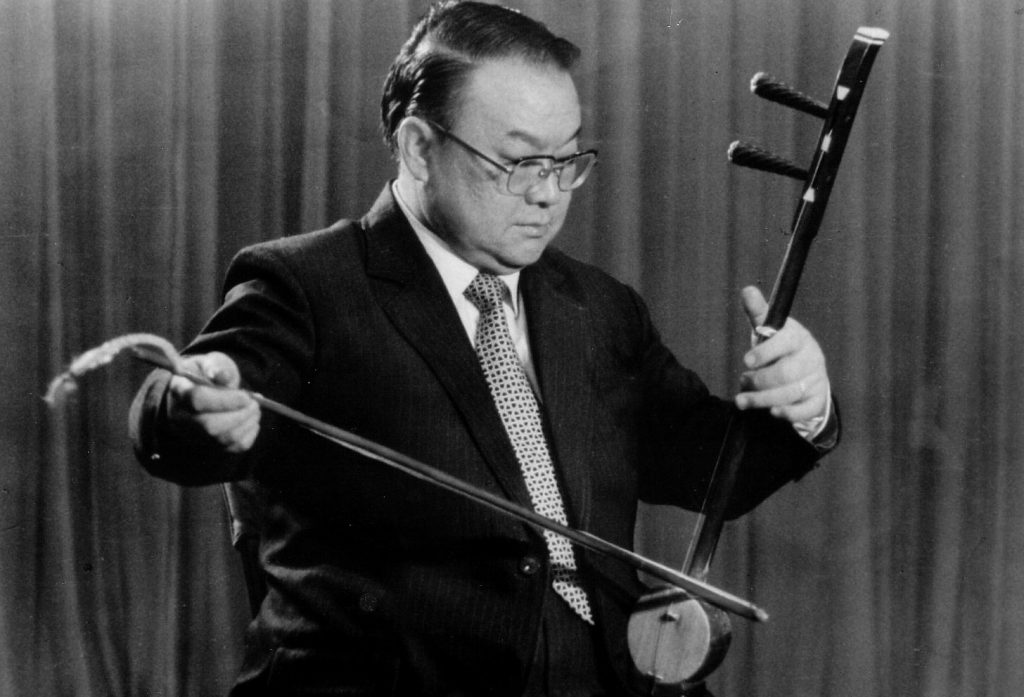
劉明源 - 中國弓弦樂之神手
劉明源, 一九三一年七月十三日(農歷五月二十八日)生於天津市紅橋區北營門外米家胡同三號, 一九九六年二月二十一日病逝於北京。五歲從父親學習板胡和京胡, 七歲登上天津中國大戲院舞臺, 演奏京胡《夜深沈》及廣東音樂《步步高》, 十一歲參加天津的「百靈社」、「八音樂社」及「聞粵會館」等國樂社團, 學習及演奏國樂曲、絲竹音樂、廣東音樂、京戲、評戲、河北梆子等。一九四七至一九五一年, 在天津勝利、皇官、永安、惠中等歌舞團任樂隊隊員。一九五二年, 應北京電影製片廠音樂科之邀, 參加電影《龍須溝》的音樂錄音, 極獲好評, 與其他六人隨即為電影廠調職留用, 成為新中國國家電影樂團的首批專業民族音樂工作者, 一九五三年時, 改組為中國中央新聞電影紀錄製片廠樂團, 劉明源成為廿八人組成的專業民族樂隊的首席及獨奏演員, 並歷任樂隊副隊長、隊長、藝委等職。一九五七年以中國青年藝術家代表身份赴前蘇聯, 參加第六屆世界青年聯歡節民間樂器演奏比賽, 演奏《大起板》、《大姑娘美》及《草原上》, 榮獲金質獎章。一九五八年起創作了《喜洋洋》、《幸福年》等民族器樂合奏精品, 風蜚海內外, 劉明源擅長演奏弓弦樂器, 板胡、二胡、中胡、京胡、高胡、四胡、墜胡、馬頭琴等無所不精, 贏得了「胡琴司令」的美譽, 除了胡琴之外, 劉明源還學會彈鋼琴, 曾擔任過爵士鋼琴師;同時, 亦曾拜師學習蒙古歌謠, 對蒙古音樂風格頗能掌握。劉明源致力於發展中國的弓弦樂器:曾改革研製了高音和中音板胡, 又創製了中胡, 並創作和改編有《喜車紅馬運糧忙》、《豐收樂》、《馬車在田野上奔馳》等板胡曲, 《草原上》等中胡曲及《喜洋洋》等民樂合奏曲, 風摩全國, 深受聽眾的普遍歡迎。一九八二年起, 調任中國音樂學院器樂系教授, 把主要精力投入在教學上, 又與他人合作著述了板胡專著《板胡基本功訓練》, 在他指導下, 一批青年演奏家脫穎而出, 均能在國內及國際的民樂大賽中榮獲大獎。劉明源所作出的貢獻獻, 是繼劉天華、阿炳之後又一位具有代表性的民族引弦樂大師。
LIU Ming-yuan
LIU Ming-yuan was born on July 13, 1931 in Tianjin, Hebei province and passed away of illness on February 21, 1996 in Beijing. His father, who worked as a doctor, was also a lover of traditional Chinese music and drama. Influenced by his father, LIU Ming-yuan started to learn the banhu and Beijing opera of five. He gave his first stage performance at the age of seven. When he was eleven, he joined the performing activities of some Chinese music groups in Tianjin, thus having the opportunity of listening to and learning from various musicians for different kinds of Chinese music. In between 1947 to 1951, he at the age joined the ensembles of Song and Dance Troupes in Tianjin. In 1952, he worked as instrumentalist and orchestrator in a Tianjin drama group. In November that year, he and other six Chinese musicians were invited to participate in the music recording of a film by the orchestra of a film company. Their performance was so good that they were invited to stay and become members of the orchestra. Since 1953 when the first professional Chinese orchestra in China was established with twenty eight members by a film company, he had been serving that orchestra as soloist and leader. Over the thirty years, he had been involved in the production of music for nearly a thousand films. In 1957, LIU Ming-yuan joined the traditional instrumental competition in the 6th World Youth Festival and won a gold medal. Since 1958, he composed, arranged and performed many pieces of Chinese light music. Through many years of persistent practice and learning, LIU Ming-yuan zhuihu and matouqin. He created a unique performing style of his own and was given a fame of “Commander mastered many Chinese bow string instruments including the banhu, erhu, gaohu, jinghu, sihu, of Huqin”. Regarding the reform of instrumenmts, he contributed in the unification of structure and improvement of tone quality of the instrumental family consisting of banhu, erhu, gaohu and zhonghu. The pieces of music performed by him on the banhu and those composed by him for the zhonghu and the erhu were very well received by the audience, and had inspired many to become professional Chinese musicians. In 1982, he started to teach in China Conservatory and concentrated his major efforts in teaching. Under his guidance, some young soloists won awards in international Chinese music competitions. He became a representative figure among the Chinese bow string masters after LIU Tian-hua and Ah Bing.
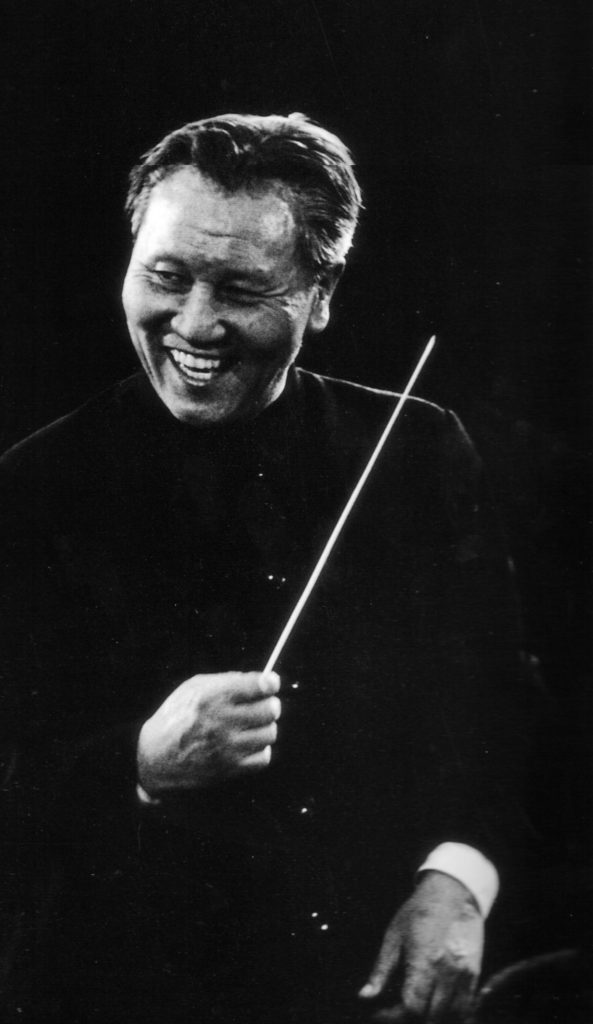
彭修文 - 中國民族管弦樂之先驅
彭修文, 一九三一年二月七日(農歷庚午年十二月二十日)生於湖北省漢口市, 一九九六年十二月二十八日因患肝疾, 病逝於北京, 享年六十六歲。由於父兄等對京劇、漢劇及絲竹樂等均有所好, 故其少年時代已漫染於樂聲中。一九三七年喪父後, 適值抗日戰爭爆發, 舉家遷往四川重慶, 在五叔指導下習奏二胡, 又從劉澤隆習琵琶, 從何軼群習小提琴。一九四四年, 小學畢業後, 就讀四川江津縣國立九中, 得該校教師, 著名二胡教育家瞿安華悉心指導, 二胡技藝得以日臻成熟。一九四六年, 得劉澤隆及夏治操之助, 與學友趙光華、古先勛等每周往國際廣播電臺國樂隊參加演奏, 廣泛接觸到各類樂曲。新中國成立後, 得西南人民廣播電臺(後易名為重慶人民廣播電臺)臺長邵子南之邀, 於一九五0年三月二日正式在該電臺文藝組任演奏、管理、編輯等工作, 在日後的兩年多期間, 接觸到大量中西音樂作品及民族民間音樂。一九五二年九月, 隨電臺國樂組部分人員調北京中央人民廣播電臺組建國樂團。一九五三年四月, 中央廣播文工團正式成立, 彭氏任該團民間音樂整理小組組長, 並擔任演奏工作, 一九五四年的元旦演出, 由彭修文試掌指揮, 並獲得成功, 同年冬, 獲與曾尋同為該團責任指揮。其後, 開始對樂隊及樂器進行積極的培訓與改革, 並創作、改編了大量的民族器樂曲, 於此四十年間, 經其創作、改編、移植、配器的大、小、古、今、中、外樂曲達四百余首(部)。早在一九五七年的第六屆世界青年聯歡節上, 彭修文改編的《春江花月夜》、《金蛇狂舞》及《關山月》, 被評為是聯歡節演出中的最佳節目, 而獲得了金獎。在創作方面, 他的交響詩《流水操》及《懷》, 在一九八三年全國民族器樂作品創作評獎中, 分別獲得一等獎與三等獎。無論是早年改編的《瑤族舞曲》、《陜北組曲》, 中期移植的《四小天鵝舞》《美麗的梭羅河》, 及後來創作的《秦.兵馬俑幻想曲》、大型套曲《十二月》、二胡協奏曲《不屈的蘇武》等等, 都能展現出彭修文對中國民族管弦樂所作出的具體經驗, 從樂器改革與樂隊培訓中都能體現其成果, 並且起到了積極的作用及深遠的影響, 他畢生的精力、卓知遠見及大膽創新, 為中國民族音樂譜寫出輝煌的樂章!
PENG Xiu-wen
PENG Xiu-wen was born on February 7,1931 in Hankou, Hubei province and passed away of illness on December 28, 1996 in Beijing. His father and brothers were keen on Peking opera, Hubei opera and their music which affected him very much. During the Sino-Japanese War started in 1937, his family moved to Chongqing, Sichuan province. He began to learn the erhu with his uncle, the pipa with LIU Ze-long and the violin with HE Yi-qun. In 1944, he further studied the erhu with JU An-hua who was the teacher of his middle school. In 1946, he and his classmates ZHAO Guang-hua and GU Xian-xun joined the International Broadcasting Station’ s Ensemble once a week where he could widely approach various kinds of music. On March 2, 1950, he was invited to join the arts group of the People’s Broadcasting Station as performer and also took responsibilities as management and edition. Over there, he kept in touching with the massive of Western and Chinese music materials. In 1952, he was transferred to the Central People’s Broadcasting Station in Beijing for setting up the traditional orchestra of the station. In 1953, the Central Broadcasting Chinese Orchestra was officially established. PENG Xiu-wen was appointed as the group leader of the folk music section. In 1954, he conducted the orchestra in the New Year’s Day Programme successfully. Later by the end of that year, he and ZENG Xun was appointed as responsibility conductor of the orchestra. He then began to reform the orchestra as well as the instruments and composed or transcribed over four hundreds pieces of Western and Chinese music for performance. Many of his works won prizes in various competitions. His hard working in training the orchestra and composing in symphonic ways of Chinese pieces wrote down an important page in the Chinese music history.
